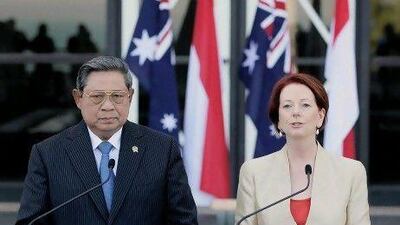SYDNEY // Australia's prime minister, Julia Gillard, and the visiting Indonesian president, Susilo Bambang Yudhoyono, yesterday pledged to work harder to prevent "people smugglers" packing asylum-seekers into the leaky fishing boats that have recently claimed 94 lives.
But, as Ms Gillard acknowledged, the main responsibility lies with Australia's deadlocked parliament.
Hopes that the latest deaths would persuade politicians to set aside their differences and find a compromise were dashed last week when the Senate rejected a bill that would have revived the Labor government's "Malaysia Solution".
The conservative Coalition, which wants asylum-seekers processed on the Pacific island of Nauru, and the Greens party, which believes they should be taken to the Australian mainland, refused to back it.
Under it, 800 asylum-seekers arriving in Australia would have been sent to Malaysia for processing, in exchange for Canberra taking 4,000 refugees waiting in Malaysia to be resettled. Last August, the High Court ruled that offshore processing was illegal.
With parliament now on a six-week break, a committee headed by the former chief of the Defence Force, Angus Houston, has been asked to bring "fresh eyes" to the problem. But as more boats arrive - 10 in the past week alone - refugee advocates say what is needed is a regional solution that will remove the need for asylum-seekers to risk their lives on the perilous voyage across the Indian Ocean.
Only a handful of countries in the Asia-Pacific have signed the United Nations Refugee Convention. Of those, just Australia and New Zealand have the resources and legal framework to handle asylum-seekers.
Andrew Williams, of the Refugee Council of Australia, believes Australia should be supporting and encouraging other countries - particularly Indonesia and Malaysia, through which many asylum-seekers from the Middle East and south Asia transit - to enshrine in law the right of would-be refugees to work, receive health care and education, and live securely.
"Without a regional refugee solution, people will continue to get into boats, looking for protection further afield," Mr Williams said yesterday. "The fact they are prepared to take that risk underlines their desperation. The frustration of those working in the sector is that both major parties are just looking for a quick political fix, but offshore processing just pushes the problem elsewhere."
Mr Yudhoyono's visit follows the drowning of at least 90 Afghan asylum-seekers two weeks ago after a boat capsized between Indonesia and the Australian territory of Christmas Island. Last week, four people died when another boat sank. Some politicians wept when news broke of the second tragedy.
For Labor and the Coalition, the debate is all about deterrence. If asylum-seekers know they will be taken elsewhere - whether Malaysia or Nauru - and may not be resettled in Australia even if accepted as genuine refugees, they will not make the journey, or so the argument goes.
The Coalition opposed Malaysia as a processing destination because of the country's failure to sign the Refugee Convention. Critics have noted that Nauru was not a signatory, either, at the time when it was used by the former Coalition government of John Howard.
The opposition leader, Tony Abbott, also insists boats should be intercepted before reaching Australian waters and forced to return to Indonesia. That is anathema to the other parties, and to many Australians.
An opinion poll by Age-Nielsen this week found that 88 per cent of people believe the major parties should work together to find a compromise. Although some hope that the committee, appointed by Ms Gillard, will act as a "circuit-breaker", many are pessimistic.
Paul Strangio, a senior politics lecturer at Melbourne's Monash University, said that since the "Tampa incident" of 2001 - when Mr Howard refused to allow a Norwegian tanker carrying shipwrecked asylum-seekers to land - the asylum issue had been framed in terms of border protection.
"That has had a debauching effect on the political debate," he said.
Ian Rintoul, of the Refugee Action Coalition, believes the current surge in boat arrivals is prompted partly by fears that the government is about to slam the door. He is unconvinced by the emotion displayed in parliament last week.
"If they were really concerned about the welfare of asylum-seekers, they would stop trying to fob them off on other countries," he said.
The spectacle of people dying at sea has prompted some former opponents of offshore processing to embrace it reluctantly. "The stink of a compromise is better than the stench of death," said Nick Xenophon, an independent senator.

